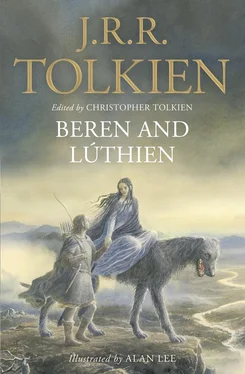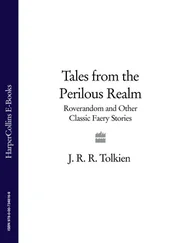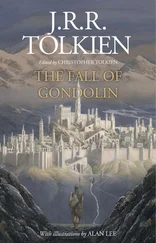The element in the story that I recall, in my mind’s eye, is that of the eyes of the wolves as they appeared one by one in the darkness of the dungeon of Thû.
In a letter to me on the subject of my mother, written in the year after her death, which was also the year before his own, he wrote of his overwhelming sense of bereavement, and of his wish to have Lúthien inscribed beneath her name on the grave. He returned in that letter, as in that cited on p. 29of this book, to the origin of the tale of Beren and Lúthien in a small woodland glade filled with hemlock flowers near Roos in Yorkshire, where she danced; and he said: ‘But the story has gone crooked, and I am left, and I cannot plead before the inexorable Mandos.’
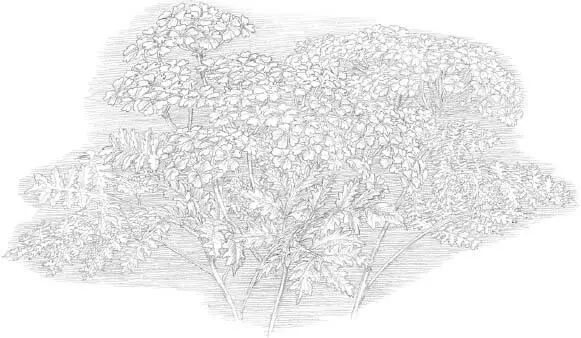
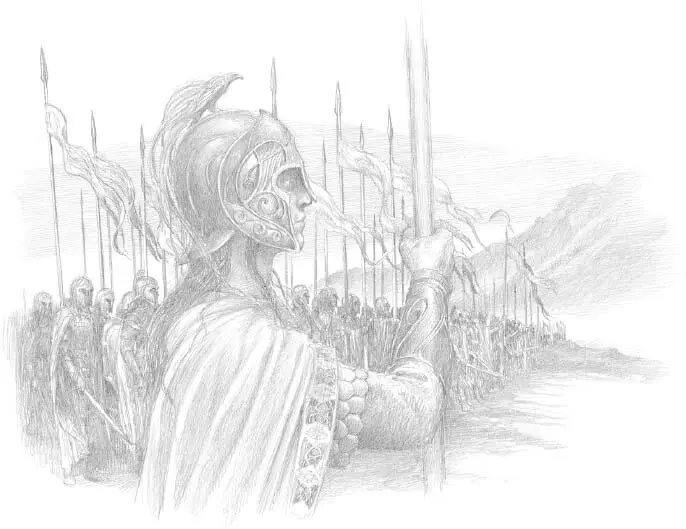
NOTES ON THE ELDER DAYS
The depth in time to which this story reaches back was memorably conveyed in a passage in The Lord of the Rings. At the great council in Rivendell Elrond spoke of the Last Alliance of Elves and Men and the defeat of Sauron at the end of the Second Age, more than three thousand years before:
Thereupon Elrond paused a while and sighed. ‘I remember well the splendour of their banners,’ he said. ‘It recalled to me the glory of the Elder Days and the hosts of Beleriand, so many great princes and captains were assembled. And yet not so many, nor so fair, as when Thangorodrim was broken, and the Elves deemed that evil was ended for ever, and it was not so.’
‘You remember?’ said Frodo, speaking his thought aloud in his astonishment. ‘But I thought,’ he stammered as Elrond turned towards him, ‘I thought that the fall of Gil-galad was a long age ago.’
‘So it was indeed,’ answered Elrond gravely. ‘But my memory reaches back even to the Elder Days. Eärendil was my sire, who was born in Gondolin before its fall; and my mother was Elwing, daughter of Dior, son of Lúthien of Doriath. I have seen three ages in the West of the world, and many defeats, and many fruitless victories.’
Morgoth, the Black Enemy, as he came to be called, was in his origin, as he declared to Húrin brought captive before him, ‘Melkor, first and mightiest of the Valar, who was before the world.’ Now become permanently incarnate, in form a gigantic and majestic, but terrible, King in the north-west of Middle-earth, he was physically present in his huge fortress of Angband, the Hells of Iron: the black reek that issued from the summits of Thangorodrim, the mountains that he piled above Angband, could be seen far off staining the northern sky. It is said in the Annals of Beleriand that ‘the gates of Morgoth were but one hundred and fifty leagues from the bridge of Menegroth; far and yet all too near.’ These words refer to the bridge leading to the dwellings of the Elvish king Thingol; they were called Menegroth, the Thousand Caves.
But being incarnate Morgoth was afraid. My father wrote of him:
‘As he grew in malice, and sent forth from himself the evil that he conceived in lies and creatures of wickedness, his power passed into them and was dispersed, and he himself became ever more earth-bound, unwilling to issue from his dark strongholds.’ Thus when Fingolfin, High King of the Noldorin Elves rode alone to Angband to challenge Morgoth to combat, he cried at the gate: Come forth, thou coward king, to fight with thine own hand! Den-dweller, wielder of thralls, liar and lurker, foe of Gods and Elves, come! For I would see thy craven face. Then (it is told) Morgoth came. For he could not refuse such a challenge before the face of his captains. He fought with the great hammer Grond, which at each blow made a great pit, and he beat Fingolfin to the ground; but as he died he pinned the great foot of Morgoth to the earth, and the black blood gushed forth and filled the pits of Grond. Morgoth went ever halt thereafter. So also, when Beren and Lúthien made their way into the deepest hall in Angband where Morgoth sat, Lúthien cast a spell on him; and suddenly he fell, as a hill sliding in avalanche, and hurled like thunder from his throne lay prone upon the floors of hell.
When Treebeard strode through the forest of Fangorn carrying Merry and Pippin each in the crook of his arm he sang to them of ancient forests in the great country of Beleriand, which was destroyed in the tumults of the Great Battle at the end of the Elder Days. The Great Sea poured in and drowned all the lands west of the Blue Mountains, called Ered Luin and Ered Lindon; so that the map accompanying The Silmarillion ends in the east with that mountain-chain, whereas the map accompanying The Lord of the Rings ends in the west, also with the Blue Mountains. The coastal lands beyond them on their western sides were all that remained in the Third Age of that country, called Ossiriand, Land of Seven Rivers, in which Treebeard once walked:
I wandered in Summer in the elm-woods of Ossiriand.
Ah! the light and the music in the Summer by the Seven Rivers of Ossir!
And I thought that was best.
It was over the passes of the Blue Mountains that Men entered Beleriand; in those mountains were the cities of the Dwarves, Nogrod and Belegost; and it was in Ossiriand that Beren and Lúthien dwelt after they were permitted by Mandos to return to Middle-earth (p. 235).
Treebeard walked also among the pine-trees of Dorthonion (‘Land of Pines’):
To the pine-trees upon the highland of Dorthonion I climbed in the Winter.
Ah! the wind and the whiteness and the black branches of Winter upon Orod-na-Thôn!
My voice went up and sang in the sky.
That country came afterwards to be called Taur-nu-Fuin, ‘the Forest under Night’, when Morgoth turned it into ‘a region of dread and dark enchantment, of wandering and despair’ (see p. 107).
The Elves appeared on earth far off in a distant land (Palisor) beside a lake named Cuiviénen, the Water of Awakening; and thence they were summoned by the Valar to leave Middle-earth, and passing over the Great Sea to come to the ‘Blessed Realm’ of Aman in the west of the world, the land of the Gods. Those who accepted the summons were led on a great march across Middle-earth by the Vala Oromë, the Hunter, and they are called the Eldar, the Elves of the Great Journey, the High Elves, distinct from those who, refusing the summons, chose Middle-earth for their land and their destiny.
But not all the Eldar, though they had crossed the Blue Mountains, departed over the sea; and those who remained in Beleriand are named the Sindar, the Grey Elves. Their high king was Thingol (which means ‘Grey-cloak’), who ruled from Menegroth, the Thousand Caves in Doriath (Artanor). And not all the Eldar who crossed the Great Sea remained in the land of the Valar; for one of their great kindreds, the Noldor (the ‘Loremasters’), returned to Middle-earth, and they are called the Exiles.
The prime mover in their rebellion against the Valar was Fëanor, maker of the Silmarils; he was the eldest son of Finwë, who had led the host of the Noldor from Cuiviénen, but was now dead. In my father’s words:
The Jewels were coveted by Morgoth the Enemy, who stole them and, after destroying the Trees, took them to Middle-earth, and guarded them in his great fortress of Thangorodrim. Against the will of the Valar Fëanor forsook the Blessed Realm and went in exile to Middle-earth, leading with him a great part of his people, for in his pride he purposed to recover the Jewels from Morgoth by force.
Читать дальше
